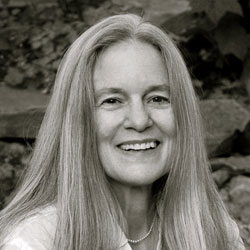My poem without me in it – would it be like
my room when I had returned to it
after my mother was done with me.
Under my bed, only the outer
space balls, of dust, only
the asteroids of hair, no bent-legs
spider drawstring purse, no fly, no
I. My poem without me in it, would it
be like her house before I was granted
the right to close my door – it had been one
hive, one queen five times my size, her
long stomach lolling like a tucker-bag.
My poem without me – like the mahogany
bookcase, with its spiral pillars,
without a book by a woman in it.
My poem without
a simile in it.
My poem like my head, as a child, when I learned
how not to have
a thought in it,
in case it were a thought one would burn for.
My poem without this ordinary female
in it – like the body politic
of a teenage woman without her special
blood in it. This old girl’s
poem without a girl in it.
I have been a child without a soul.
The poem is a vale of soul-making.
Notes on the Poem
We actually cannot imagine a poem by Sharon Olds minus her strong and singular presence, in the spotlight, offering vibrant commentary or at very least hovering unmistakeably in the near background. Let's take a look at "My Poem Without Me in It" from Olds' 2020 Griffin Poetry Prize shortlisted collection Arias, confirm that she's there ... and try to understand why she would even suggest such a thing as a Sharon Olds-less poem. Maybe Olds (or the narrator with Olds' voice) really considered for a brief moment a poem without her presence, something expressed at arm's length. But only one line in, she is illustrating the impossibility of such a piece issuing from her pen. As the 2020 Griffin Poetry Prize judges observed, "there is the heft of heavy lifting, of difficult emotional material moving like magma under enormous pressure to issue volcanically, irrupting into the moment of the poem." "would it be like my room when I had returned to it after my mother was done with me." is the simple, poignant, heart-searing comparison Olds uses to reconcile the poem's title with the lifelong burden of childhood trauma she bears, that emotional material that has so swiftly burst into the poem. Self-abasement and self-deprecation are interwoven through the balance of the poem, including the alternately sad and menacing "My poem like my head, as a child, when I learned how not to have a thought in it, in case it were a thought one would burn for." But also slyly slid into the poem is criticism of her oppressor ... "one queen five times my size, her long stomach lolling like a tucker-bag" and, in acknowledging the damage done "I have been a child without a soul" further acknowledgement that she has the tools to mend herself: "The poem is a vale of soul-making." A vale or valley might, on one hand, be a low point in the terrain but is perhaps a place of sanctuary where the soul is truly forged. Throughout the poem, Olds refers to containers and repositories, including a drawstring purse, a tucker-bag, a bookcase and even the suggestion of one's own body. With these, she can both hold and preserve what is precious to her, and with the portability of many of them, she can travel or escape. Olds' narrator is very much in her poem. That affirmation is a gift for all who are very much in the starring and central roles in their own respective lives' poems, and should feel justifiably proud of how they have travelled and survived.
